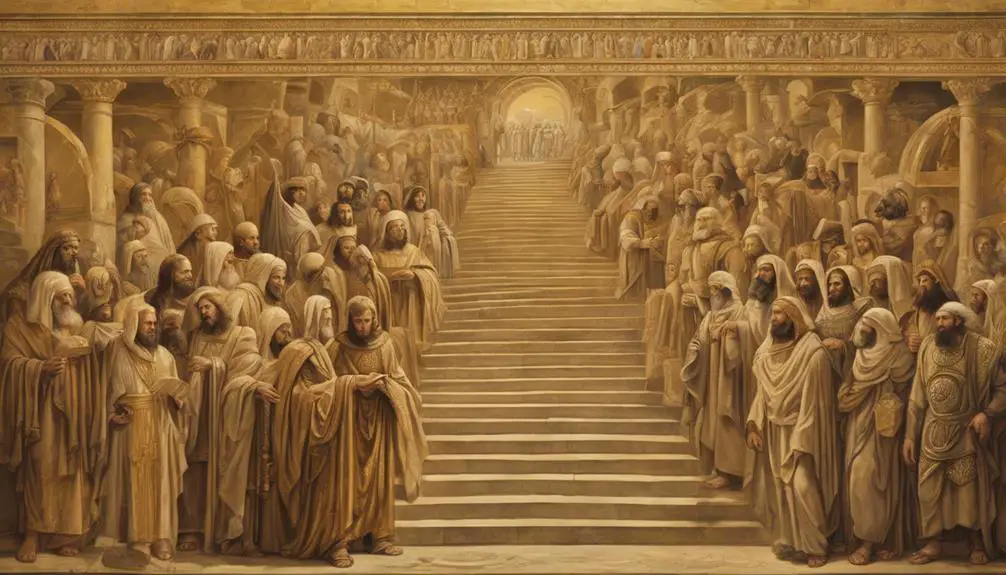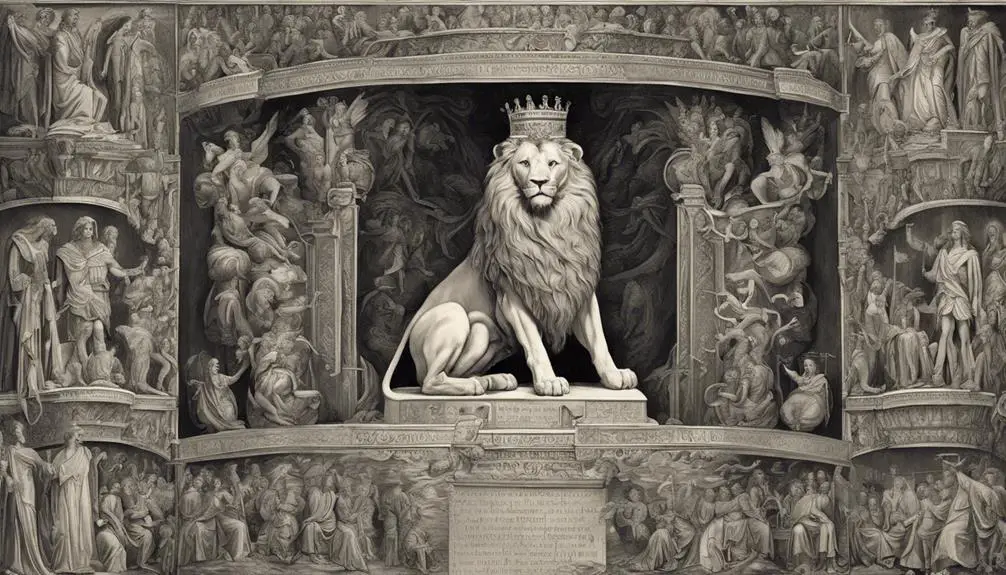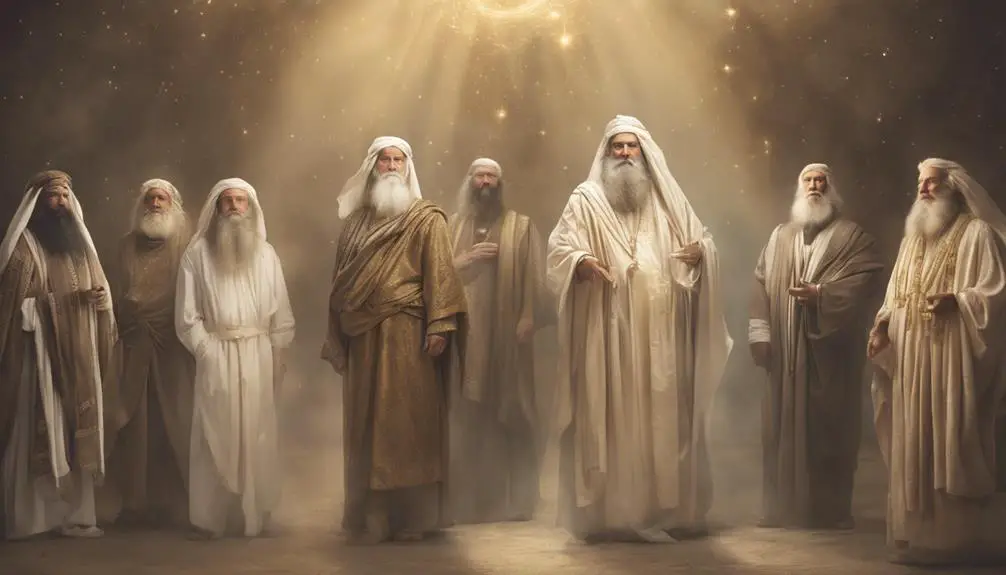Glimpse the often overlooked elite figures in the Bible and unravel their profound influence on history, faith, and the divine narrative.

Who Are the Elite in the Bible
Just like a jeweler carefully examines precious gems, you too might be intrigued to scrutinize the elite figures in the Bible. These aren't just your average prophets or kings; they're individuals who've shaped history, commanded nations, and even, on some occasions, interacted directly with the divine.
But who exactly are these elite, and what sets them apart from the rest? Let's embark on this fascinating exploration together, and you might just find some surprising revelations along the way.
Key Takeaways
- The biblical elite include divinely chosen individuals such as priests, prophets, and kings who play pivotal roles in God's plan.
- Kings and rulers, like King David, are considered elite due to their divine appointment and influence on spiritual and societal conditions.
- Prophets are part of the spiritual elite, tasked with delivering God's messages and steering the people towards righteousness.
- Elite figures in the Bible also encompass wealthy individuals like tax collectors and Levites, and powerful women leaders, prophets, and disciples.
Defining Biblical Elite

While the term 'elite' may conjure images of superiority and exclusivity in a modern context, in the Bible, it often refers to individuals who were chosen by God for specific roles or tasks, demonstrating divine wisdom and purpose rather than social hierarchy or wealth. This divine selection wasn't arbitrary; it was driven by God's profound wisdom, which we can't fully comprehend.
You'll notice the idea of 'Priestly Influence' as a significant aspect of this divine selection process. Priests were considered elite not due to their wealth or social standing, but because they were chosen by God to mediate between Him and the Israelites. They were the spiritual leaders, responsible for maintaining the sanctity of the tabernacle and offering sacrifices on behalf of the people.
Another aspect to consider is 'Divine Favoritism'. Though it may seem unfair in human terms, God's favor isn't bound by our understanding of equality. The biblical elite were often those who found favor in God's eyes, like Noah and Abraham. However, this favoritism wasn't about preference, but purpose. It was about fulfilling God's divine plan, and those chosen played crucial roles in the narrative of salvation.
Kings and Rulers in the Bible

In addition to priests, kings and rulers also hold a significant place in the biblical elite, anointed by God to guide His people and execute His divine will. These divine appointments in kingship, like those of Saul, David, and Solomon, weren't accidents, but rather intentional acts of God to fulfil His plan for His people.
You'll notice that the influence of kings in the Bible was profound. Their decisions, whether righteous or sinful, directly impacted the spiritual, social, and economic status of their kingdoms. For example, under King David's rule, Israel enjoyed a period of prosperity and spiritual revival. Conversely, under King Ahab's rule, Israel suffered spiritual decline due to his idolatry.
Biblical kings were more than just political figures; they were God's chosen instruments. Their role wasn't only to govern but also to uphold God's law, ensure justice, and guide the people towards righteousness. However, their human weaknesses often led them astray, reminding us that even the elite are imperfect and dependent on God's mercy.
In essence, the Bible's kings and rulers epitomize the tension between divine appointment and human frailty, demonstrating God's sovereignty amidst human failings.
Prophets: Spiritual Elite

Beyond kings and rulers, you'll find prophets standing as spiritual elite in the biblical narrative, chosen by God to deliver His divine messages and guide His people. Prophets are unique in their prophetic roles and their ability to engage in divine communication, serving as intermediaries between God and His people.
Let's delve into this intriguing role:
- Messengers of God: Prophets are divinely chosen to deliver God's word to the people. They're the spiritual mailmen, delivering divine messages with precision and clarity. Remember, their role isn't self-appointed; it's a divine calling.
- Spiritual Guides: They're not just messengers. Prophets serve as spiritual compasses, guiding the people in the ways of the Lord. They provide spiritual direction, steering the people towards righteousness and away from sin.
- Intercessors: Prophets stand in the gap, praying for the people, and pleading their case before God. They're spiritual advocates, interceding on behalf of the people.
In the biblical narrative, you'll find that prophets hold a unique position. They're not just religious figures; they're the spiritual elite, chosen by God to fulfill these crucial roles. Their service isn't about earthly riches, but about spiritual wealth – a topic we'll explore in the next subtopic.
Wealthy Individuals in Scripture

Shifting our focus to wealth, the Bible also features numerous individuals who amassed considerable earthly riches, showcasing another form of elite status. Among them, two groups particularly stand out: the tax collectors with their affluence and the Levites with their prosperity.
You've likely read about the tax collectors, who were often viewed unfavorably due to their work for the Roman Empire. Yet, they were undeniably wealthy. Zacchaeus is a prime example, a man whose affluence was significant enough that his decision to give half of his goods to the poor was impactful.
The Levites, on the other hand, held a different kind of wealth. As religious leaders, their prosperity wasn't always monetary. Instead, it was reflected in their respected position in society, their ownership of cities and pastures, and in the tithes and offerings they received from the other tribes of Israel.
Thus, the Bible portrays wealth as multifaceted, not confined to mere financial accumulation. There's a wealth of influence, respect, and spiritual authority, as demonstrated by the tax collectors and Levites alike. These groups, though vastly different, both belonged to the economic elite of their time.
Elite Women in Biblical History

While contemplating the diverse forms of biblical elite, you can't overlook the powerful women who left indelible marks on religious history. These women, often underestimated, served as leaders, prophets, and disciples, challenging the societal norms of their time.
- Female Discipleship: Women like Mary Magdalene and Martha, who followed Jesus, weren't only devout followers but also key figures in spreading the teachings of Jesus. They're prime examples of female discipleship, showing strength and resilience despite societal restrictions.
- Women's Prophecies: Women like Deborah and Huldah weren't only leaders but also prophets. They played crucial roles in interpreting God's word and shaping the course of biblical history. Their prophecies guided kings and influenced key decisions.
- Leadership: Women like Queen Esther and Ruth became leaders in their own right. They displayed exceptional courage and wisdom, changing the course of history and serving as powerful role models.
In these women, you see a unique blend of faith, bravery, and leadership. They weren't only followers but also leaders and prophets. Their stories are a testament to the importance and influence of women in biblical history.
Frequently Asked Questions
How Has the Concept of 'Elite' in the Bible Influenced Modern Religious Practices?"
The concept of 'elite' in the Bible has significantly shaped modern religious practices. You see this through the emphasis on 'elite's morality' and biblical elitism. It's created a standard of high moral conduct, often reserved for religious leaders.
This concept has influenced the formation of church hierarchies, where leaders are expected to embody these 'elite' virtues. It's also led to certain expectations among congregation members about the moral conduct of their leaders.
What Are Some Controversial Viewpoints About the Concept of 'Elite' in the Bible?"
You may find differing opinions on 'elite divisions' within the biblical hierarchy. Some argue these divisions promote inequality, while others believe they're necessary for order. Critics question if these elites truly represent divine will or if they're self-appointed.
Supporters, however, see them as God's chosen leaders. It's a complex topic with no clear consensus, reflecting the diverse interpretations of the Bible's teachings.
How Does the 'Elite' in the Bible Compare to the 'Elite' in Other Religious Texts?"
You're comparing biblical elites to those in other religious texts. The 'elite' definitions vary across religions, yet biblical elitism stands out. Unlike some texts where elitism is often linked to wealth or power, the Bible's elite are those with profound faith and righteousness.
They're not necessarily affluent or influential, but they're spiritually superior. It's a unique perspective, contrasting other religious interpretations of the 'elite.'
Are There Any Examples of 'Elite' Individuals in the Bible Who Were Not Kings, Rulers, Prophets, Wealthy, or Women?"
You're asking about 'elite' individuals in the Bible who weren't kings, rulers, prophets, wealthy, or women. Consider the concept of 'Elite Discipleship.' These were ordinary people, like fishermen or tax collectors, called by Jesus to follow him.
They embraced 'Biblical Servanthood,' becoming leaders through service. They may not have been elite in societal terms, but their spiritual significance was immense.
How Have the Stories of the 'Elite' in the Bible Been Interpreted and Reinterpreted Throughout History?"
You've seen how 'Elite Interpretations' of biblical stories have shifted over time. These 'Historical Reinterpretations' reflect societal changes, cultural shifts, and evolving theological perspectives. They're not stagnant, but rather a dynamic dialogue between the text and its interpreters.
You've observed how these elite figures are viewed differently across centuries, revealing much about our own understandings, assumptions, and priorities. Indeed, their stories are mirrors reflecting our evolving worldviews.
Conclusion
So, you've explored the elite in the Bible – from kings and rulers to prophets, the wealthy, and influential women. They were individuals with power, influence, or wealth.
Yet, remember, the Bible often challenges the elite's actions, reminding them, and us, of the importance of humility, justice, and compassion. It's a timeless lesson, isn't it?
No matter your status, what truly counts is your character and your actions towards others.



Sign up